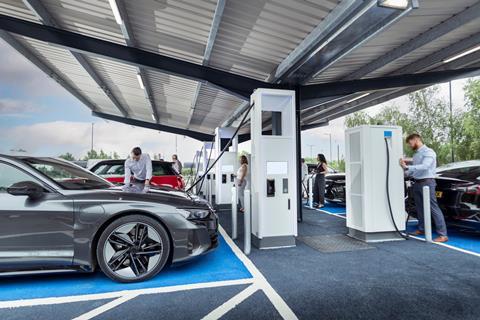
The Zero Emission Vehicle (ZEV) Mandate, which requires UK car manufacturers to produce a minimum quote of EVs, has been voted through Parliament this week.
Coming into force on January 1, 2024, the mandate, requires car makers to ensure 22% of their cars sold in the UK next year generate no tailpipe emissions. This rises to 28% in 2025, 33% in 2026, 38% in 2027 and 52% in 2028 – increasing to 100% in 2035.
Financial penalties for failing to meet these targets are hefty, at £15,000 for each non-compliant car.
For vans, the annual targets are 10% in 2024, 16% in 2025, 24% in 2026, 34% in 2027 and 46% in 2028 – again rising to 100% in 2023.
For non-compliant vans, manufacturers face a £9,000 penalty per vehicle in the first year, with this figure rising to £18,000 throughout the remainder of the mandate.
Ian Plummer, commercial director at Auto Trader, said legal confirmation of the ZEV mandate gives the industry the clarity it needs, but he believes some manufacturers will struggle to hit the targets as they are behind the curve on electric sales.
Meanwhile, tougher new UK-EU Rules of Origin which were due to begin on January 1, 2024, are expected to be postponed by the European Commission.
The tougher rules would have seen EV prices rise as tariffs for batteries and the materials to make the batteries would have increased. However, experts believe the EC will give the go-ahead for a three-year postponement to help European manufacturers compete with car makers from China.
SMMT chief executive Mike Hawes, said: “Car makers and governments on both sides of the Channel have called for a common sense approach to retain the current EV battery rules for a further three years, which would support consumer choice and affordability.”
Jon Lawes, managing director at Novuna Vehicle Solutions and MHC Mobilities, said: “If approved this breakthrough is a lifeline for the UK and European motor industry. The Rules of Origin tariffs have cast a long shadow over the switch to EVs in the UK and Europe. With UK EV registrations declining in November, the rules threatened to further hit vehicle production costs and dampen EV adoption.
“With the New Year’s cliff edge averted, the industry and policymakers on both sides of the Channel need to focus on scaling up domestic battery capacity and tackling the persistent charging infrastructure deficit to create a sustainable, competitive market for EVs.”
































